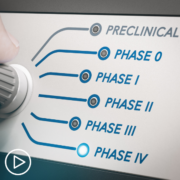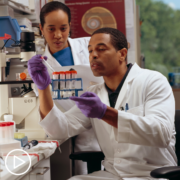DLBCL Treatment Approaches: What You Need to Know
DLBCL Treatment Approaches: What You Need to Know from Patient Empowerment Network on Vimeo.
What do you need to know about diffuse large b-cell lymphoma (DLBCL) treatment options? DLBCL expert Dr. Justin Kline discusses current therapies for newly diagnosed and relapsed/refractory patients, reviews promising research, and shares tools for staying up to date on the latest treatment approaches.
Dr. Justin Kline is the Director of the Lymphoma Program at the University of Chicago Medicine. Learn more about Dr. Kline, here.
See More From The Pro-Active DLBCL Patient Toolkit
Related Resources:

|

|

|
Transcript:
Katherine:
Hello, and welcome. I’m Katherine Banwell, your host for today’s webinar. Today we’re going to discuss diffuse large B-cell lymphoma or DLBCL and explore current and emerging treatment approaches. Before we meet our guest, let’s review a few important details. The reminder email you received about this webinar contains a link to program materials. If you haven’t already, click that link to access information to follow along during the webinar. At the end of this program, you’ll receive a link to a program survey. Please take a moment to provide feedback about your experience today in order to help us plan future webinars.
Finally, before we get into the discussion, please remember that this program is not a substitute for seeking medical advice. Please refer to your healthcare team about what might be best for you. Joining us today is Dr. Justin Kline. Welcome, Dr. Kline. Would you please introduce yourself?
Dr. Kline:
Hi, thank you. Yes, my name is Justin Kline. I am an associate professor of medicine at the University of Chicago, medicine.
I’m the director of the lymphoma program, which basically means I specialize in taking care of folks who’ve been diagnosed with various types of lymphomas.
Katherine:
Thank you so much for taking time out of your schedule to join us.
Dr. Kline:
Pleasure.
Katherine:
Let’s start by understanding what DLBCL is and how it progresses. How would you define DLBCL?
Dr. Kline:
Well, diffuse large B-cell lymphoma is a malignancy of a normal counterpart cell called a B-cell, which is part of our immune system. Its job is to make antibodies, to help protect us from various types of infections. Diffuse large B-cell lymphoma, or DLBCL, initiates when normal B-cells acquire changes in their genetic machinery, like any cancer. And DLBCL is the most common form of non-Hodgkin lymphoma. We classify it as aggressive, as an aggressive lymphoma, which means if left untreated it tends to grow pretty quickly.
Katherine:
How is it typically diagnosed?
Dr. Kline:
Well, it varies. But like any cancer, a diagnosis requires some sort of a biopsy, either a surgical removal of a lymph node or a needle biopsy of a lymph node or another structure where the tumor seems to be growing.
Katherine:
How does somebody know if they have DLBCL?
Dr. Kline:
Well, there are certain symptoms that are more common amongst folks with DLBCL. And they’re not specific to DLBCL, they can be seen in other lymphomas, but they include symptoms like fatigue that’s unrelenting, unintentional weight loss, sometimes fevers, typically at similar times throughout the day, drenching night sweats, swollen lymph nodes, and then certainly pain in any area of the body that comes and doesn’t go. Those are some of the general symptoms.
Katherine:
And how does the condition progress?
Dr. Kline:
Well, as I mentioned, DLBCL tends to be an aggressive lymphoma, so sometimes folks will notice enlarged lymph glands that continue to grow and grow and grow. Sometimes they’re painful, sometimes not so much. DLBCL, it can really grow anywhere, so we think of it as a lymphoma and so involving lymph nodes, but DLBCL can grow in any organ, even outside of lymph nodes. And so it sometimes progresses locally, but it also can spread and start to grow in other areas of the body.
Katherine:
And how is it staged, Dr. Kline?
Dr. Kline:
Well, there’s a special staging system for all lymphomas that is somewhat similar to what folks might think of with solid tumors like a breast cancer, a lung cancer. But in other ways, it’s different.
The staging tools for DLBCL are really most importantly PET scans and CT scans, really PET scans and in some cases bone marrow exams or bone marrow biopsies. The PET scan is a very sensitive scan that uses radioactive glucose to identify very sensitively where in the body lymphoma might be growing, because lymphoma cells really preferentially prefer to use glucose as their primary energy source. So, they preferentially take up the radioactive glucose that’s given through the vein before the PET scan is taken.
As I mentioned, in some cases, a bone marrow test is also done, although less and less frequently. Which is good, because that’s a more invasive and uncomfortable test. And so folks who have early stage DLBCL that typically involves one lymph node group, like for example, a lymph node in the neck or several lymph node groups on the same side of the breathing muscle, of course you can’t see my breathing muscle here, called the diaphragm.
Those are stage I and stage II DLBCLs. stage III DLBCLs are those that involve lymph nodes on either side of the breathing muscle, so in other words, lymph nodes involved in the neck and then maybe in the groin area, where stage IV DLBCLs are those that involve sites outside of lymph nodes like the liver or the lungs or the bones.
Katherine:
What are the subtypes of DLBCL?
Dr. Kline:
Well, that’s a good and somewhat complicated question. So there, probably most importantly, there’ve been two subsets, if you will, of DLBCL identified, and they really have to do with where along the normal maturation course a B-cell becomes lymphoma or where the DLBCL develops in that normal maturation course. Some DLBCLs arise from what we call germinal center B-cells, which are B-cells that are sort of just seeing their natural antigen or what they’re supposed to recognize.
And then there are DLBCLs that arise in more differentiated or more mature B-cells, and those are called activated B-cell type DLBCLs. So, there’s germinal center and activated, the B-cell type DLBCLs. And I don’t know that that’s super important for your listeners to know, but it is important because these two subtypes of DLBCL are driven by largely separate mutations or alterations in the DNA, and they also respond differently to initial treatment. There are other rare subtypes that involve specific mutations and genes like MYC and BCL2, and these are the so-called double-hit lymphomas. They’re officially classified as high-grade lymphomas, but they’re very similar to DLBCLs. There are other rare subtypes of DLBCL, for example, a type that comes on typically in young men and women called primary mediastinal B-cell lymphoma.
But I think for the sake of simplicity, the most common two subtypes are the germinal center derived and then the activated B-cell type of DLBCL.
Katherine:
All right. That’s good to know, thank you. It helps us understand the disease a little bit better.
Dr. Kline:
Good.
Katherine:
Let’s move onto treatment. From what I understand, treatment really should start right away. So, what types of treatment are currently available to someone newly diagnosed with DLBCL?
Dr. Kline:
Sure, so for about 20 plus years now, the standard of care for most patients with DLBCL, regardless of whether it’s a germinal center or an activated B-cell type DLBCL, is a combination of what we call chemo immunotherapy, the acronym for which is R-CHOP, and each of those letters stands for a different medication. The R stands for rituximab, which is an antibody that coats the surface of lymphomatous B cells and sort of signals the immune system to come and kill those cells.
The C is cyclophosphamide, the H is hydroxy doxorubicin, and the O is Oncovin. These are each classical chemotherapy drugs, and they each work through a different mechanism to help kill lymphoma sells. And the P is a steroid pill called prednisone, so it’s a little bit complicated, but the reason that we use cocktails of medicines to treat lymphomas is that it really works to prevent the lymphoma cells from gaining the upper hand, from developing resistance to a single type of treatment.
Katherine:
Right.
Dr. Kline:
Now, I should say that for certain DLBCLs, particularly those double hit lymphomas that we talked about, sometimes we use a more intensive cocktail called dose-adjusted R-EPOCH. It has largely the same medications with an additional chemotherapy called etoposide.
The difference is that R-CHOP is given – all the drugs are given intravenously, with the exception of prednisone, over a single day. The dose-adjusted R-EPOCH is given over an infusion over the course of about five days. The other point I might make is that there was a recent large clinical study that compared R-CHOP to a new regimen called polatuzumab R-CHP. So, basically the O in R-CHOP was removed and substituted for this new drug called polatuzumab vedotin, and although many, many combinations similar to R-CHOP have been compared to R-CHOP over the past 20 years and failed, this regimen, polatuzumab R-CHP in the study called the POLARIX study actually was shown to improve what we call progression-free survival by about six percent. So, it may become a new standard of care for treating DLBCL, which is exciting, because we haven’t had one in over 20 years.
Katherine:
Right. That’s good news.
Dr. Kline:
Long answer to a short question, sorry about that. Yes, it is good news.
Katherine:
That is good news. What about stem cell transplants?
Dr. Kline:
Good question. So, for newly diagnosed patients, in this era, we rarely if ever are recommending stem cell transplant or stem cell transplantation as part of initial therapy. There are rare circumstances, but for the vast majority of patients who are, people who are diagnosed with DLBCL, it’s not recommended.
Katherine:
Where do clinical trials fit in?
Dr. Kline:
It’s a really good question. I practice at an academic medical center, and so one of our missions is to advance therapy and make it better. There’s no way to do that without performing clinical trials, so I think for – clinical trials aren’t for everyone. As a matter of fact, most people with lymphoma are not treated in the context of clinical trials.
But certainly I think they are important to consider, and number one, it’s possible that the particular person might be involved with the clinical trial that is very successful and actually improves their outcome. I always tell people that I see that being involved with the clinical trial is also, to some extent, an altruistic endeavor. You’re helping your doctors learn more about how to treat a type of cancer, hopefully better, maybe not, you know? So, there is some altruism that goes into clinical trials as well. So, I do think that most people who are able should consider having a second opinion. Doesn’t have to be at an academic medical center, but at least with another doctor, where clinical trial options can be discussed.
Katherine:
Other than a newly diagnosed patient’s stage of DLBCL and their age, what other factors would impact a treatment decision?
Dr. Kline:
Yeah. So, that’s a good question, so you named I think the biggest two, the most important two. Although I have to say that even people in their – oftentimes in their 80s are prescribed full dose therapy. The goal of our treatment, especially in newly diagnosed patients, is to cure the lymphoma, and so we tend to be aggressive. But outside of age, other things we consider are other health problems. Does the person have a healthy heart, healthy kidneys? How many other medical problems does the person have? How fit is the person? How sick is the person or symptomatic is the person from him or her lymphoma? And sometimes we take into consideration all those factors and we say, well, it’s still worth it to try to deliver the most intensive therapy that we can.
Other times we say, you know what? I think the risk of doing such is probably not worth the potential benefit, and so sometimes we’ll recommend dose reductions, reduce the doses of some of the medicines and the R-CHOP cocktail if that’s what we’re going to do, and occasionally, if the person has too many other things going on, we may talk about more palliative treatments, in other words, gentler treatments that may extend a person’s survival while hopefully maintaining a really good quality of life.
Katherine:
Yeah. What kind of side effects should patients expect?
Dr. Kline:
Well, that’s a conversation I’ve had many, many, many times over the years. And specifically to the R-CHOP cocktail, just because that’s the one that’s used most commonly, I tell people that the most common things are symptoms like fatigue, occasionally nausea, sometimes vomiting, although the medications we have to prevent those things are very good these days.
Constipation is not uncommon, hair loss, mouth sores. I think probably the most important thing is to recognize that the chemotherapy will suppress or reduce the immune system, and so we’re always worried about people catching infections when they’re on chemotherapy, because sometimes they can be serious. And then I talk about rare symptoms that are a big deal. Sometimes the chemotherapy can damage organs like the heart. It’s uncommon, but it happens sometimes. And chemotherapy, while we need to give it to cure the lymphoma, can sometimes cause secondary blood cancers like leukemias years down the road. The risk is low, but again, these are I think serious things that people, even if they’re rare, people need to know about them before they start.
Katherine:
Yeah. Let’s turn to what happens after treatment. How is the effectiveness of the treatment monitored?
Dr. Kline:
Well, so depends on the doc to some degree, but I like to do some, what I call interim imaging. So, we’ll typically, again, depending on the stage, but very often we’re delivering six treatments of R-CHOP, usually given every three weeks. So, the total treatment course is about four and a half months. It can be a little bit shorter for patients who have Stage 1 or Stage 2 DLBCLs. I like to get interim imaging, which is either a PET scan or a CAT scan, done sort of in the middle of treatment, just to give us a sense of how things are going. Are the lymphomatous tumors shrinking down? Some patients are, even by the middle of treatment, are in a complete remission. Their PET scan has gone totally normal. And then at the end of treatment, that’s probably the most important imaging, and there I do like to do PET scans again. Again, they’re the most sensitive test we have to detect lymphoma.
And so at the end of treatment, usually about four to six weeks after somebody completes treatment, we like to get that end of treatment PET scan, and that’s the PET scan that allows us to say, you’ve had a complete response. You’re in a complete remission, or not.
Katherine:
So, what does remission mean exactly then?
Dr. Kline:
So, in DLBCL, remission is pretty simply defined as absence of disease on, or absence of cancer on the tests that we do to detect it. Again, typically PET scans, and if somebody had involvement of his or her bone marrow at the beginning before treatment, we’ll repeat that bone marrow at the end of treatment just to make sure that there’s no lymphoma left over. And so, but for most people it’s a PET scan. If the PET scan does not show any abnormalities, then that’s what we call a complete remission or remission.
Katherine:
Is a cure possible for patients with DLBCL?
Dr. Kline:
Cure is not only possible, it’s actually quite common. If you look at all comers, regardless of stage, age, what have you, approximately 60 to 65 percent of folks who are treated for DLBCL are cured. The cure rates are higher with folks with earlier stage lymphomas, but even folks who have advanced DLBCL are frequently cured.
Katherine:
That’s great news. Let’s talk about if someone doesn’t respond to initial treatment or they relapse. Let’s start by defining some terms for the audience. What does it mean to be refractory?
Dr. Kline:
So, refractory is a term that’s used to describe a situation where a person has received treatment but that treatment hasn’t worked as well as we have expected. And the most – probably the most important scenario is after initial treatment.
Most people, for example, who receive R-CHOP, somewhere between 80 and 85 percent will have a completely negative PET scan after treatment. That’s remission. If the PET scan is not negative and you do a biopsy and it shows that there’s still lymphoma there, that’s what’s called primary refractory. In other words, the person’s lymphoma was refractory to initial or primary treatment. And in clinical trials that are testing agents, drugs or immunotherapies in folks who’ve had multiple treatments, usually refractory is used to define someone who has either not responded or has had a very, very short response to whatever the last treatment they had was.
Katherine:
How does relapse then differ from refractory?
Dr. Kline:
So, right, so relapse suggests that the lymphoma at some point was in a remission, right?
And so for example, a person gets six treatments of R-CHOP, has a PET scan at the end, the PET scan is clean. We say you’re in remission. Eight months later, the person develops a newly enlarged lymph node, and a biopsy shows that the lymphoma has come back, right? That’s what we would call a relapse. There was a period of remission, whereas refractory usually means there was never a period of remission to begin with.
Katherine:
Got it. How typical is it for a patient to relapse?
Dr. Kline:
Well, again, if you look at all comers, if you treated 100 people with DLBCL, most, probably 70 to 75 percent, would go into remission. About 10 or 15 percent would have primary refractory disease and another 10 or 15 percent would have a remission that would end at some point and they would have a relapse. So, it’s not terribly common.
The problem is that once the lymphoma has either demonstrated that it’s refractory to treatment or it’s come back, it’s relapsed, it’s a little bit more difficult to cure the lymphoma at that point.
Katherine:
How are patients treated then if they’ve relapsed or refractory?
Dr. Kline:
Well, so for somebody who’s had primary refractory lymphoma or has a lymphoma that’s relapsed after initial therapy, again, say for the sake of argument with R-CHOP, for many, many years, the next line of treatment if you will was to administer what we call salvage chemotherapy, and this is different chemotherapy from the original R-CHOP, that’s meant to put the lymphoma back into remission. In other worse, to salvage a remission. And for folks whose lymphomas were sensitive or responded, shrunk down to that salvage chemotherapy, we would consolidate that remission.
We would make it deeper using high dose chemotherapy and an autologous or a cell, stem cell transplant. And that’s been the standard of care for younger patients for decades.
That paradigm has been challenged, particularly in refractory patients or those who have very early relapses after R-CHOP, by two important clinical trials that have demonstrated superiority of a type of immunotherapy, a cellular immunotherapy called CAR T-cell therapy, which seems to be more effective even than stem cell transplantation in that population of folks.
Katherine:
What about emerging therapies, Dr. Kline? What approaches are showing promise?
Dr. Kline:
Well, I think probably in DLBCL, the biggest breakthrough, I don’t even know that I can call it emerging at this point, because it’s on the market, so to speak.
But I think it’s important to talk about, again, is CAR T-cell therapy, and this is a type of immune therapy where a person’s own immune cells called T-cells are taken from his or her bloodstream. And then using a special type of a virus, those T-cells are manipulated or engineered, that sounds better, to express on their surface something called a chimeric antigen receptor, which is somewhere between an antibody and a normal T-cell receptor. But anyhow, this chimeric antigen receptor confers or allows the T-cell to recognize a protein that’s expressed on the surface of B-cells, cancerous or otherwise, called CD19. And when that chimeric antigen or CAR antigen, excuse me, that CAR receptor expressing T-cell sees a lymphoma cell, it engages it and kills it, a pretty clever idea which has been in the works for decades now.
But CAR T-cell therapy has now been approved for not only DLBCL but many other types of non-Hodgkin lymphoma. And I think in the past decade, far and away, that’s the biggest breakthrough. There are other types of immunotherapy, probably most notably a type called bispecific immunotherapy, which is a pretty clever type of immune therapy where these specially engineered antibodies that are capable of binding or sticking to not only a person’s T-cell, a T-cell that’s already in his or her body, and a B-cell, a lymphoma cell that’s right next to that T-cell, sort of holds them together, and the part that binds the T-cell actually activates it, triggers it to kill the B-cell. And so there are a number of companies that have those bispecific therapies that are in development. I suspect a couple will be approved by the FDA, I would guess, in 2022.
These bispecific immunotherapies have been very effective, again, in DLBCL that’s come back, relapsed or refractory, as well as in other lymphomas. They do have some side effects that are similar to what we see in folks with CAR T-cell therapy. I won’t belabor what those are, but they are also very effective. There’ve been a number of drugs that, either immunotherapies or other types of therapies, that target that same CD19 protein on diffuse large B-cell lymphoma cells that have recently been approved by the FDA, either alone or in combination. Targeted therapies are always exciting. Although as compared with other lymphomas, these targeted therapies, many of which are oral, which are pills, have not been particularly effective in relapsed DLBCL.
So, I think that among the most exciting therapies are those that take advantage of our own immune systems to recognize and kill the lymphoma cells.
Katherine:
With all of these treatments in development, how can patients ensure that they’re receiving the latest treatment options?
Dr. Kline:
Yeah. It’s complicated, even for somebody who’s in the business. There are so many clinical trials going on all over the place and at various stages. I think, as I mentioned early on in our conversation, one of the best ways to make sure that you or your loved one is receiving the most advanced care is to get that second opinion, particularly at a center that does clinical trials. And it doesn’t have to be an academic center. There are many offices in the community that also run clinical trials, but I think meeting with somebody who treats DLBCL for a living at least once to talk about those options is a good idea.
The second approach is really to get engaged. And it may not be the person with lymphoma, sometimes it’s a spouse or a child, usually a grown child, but doing due diligence, getting involved with websites, Lymphoma Research Foundation, Leukemia-Lymphoma Society, where you know you’re getting good information. Folks like you guys who are involved in patient education. I think I have seen many patients who come in extraordinarily well educated about DLBCL, even before their first visit, and I do think it does make a difference in helping them decide what and where they want to get their treatment.
Katherine:
Yeah. What resources would you recommend for patients to help them stay up to date or to learn more about their disease?
Dr. Kline:
Sure, yeah. Again, I think as folks sort of meet with their oncologist or oncology nurse, each office or center may have their own specific recommendations. I really like, as I mentioned, the Lymphoma Research Foundation, which I think is LRF.org*, the Leukemia & Lymphoma Society, LLS.org. They not only have a website that has a lot of information on it, but they often have patient education days once or twice a year where specific lymphomas are discussed in their treatment, that’s geared toward people with lymphoma and their caregivers.
They also have, it talks about dealing with chemotherapy, the financial toxicity associated with cancer treatments, how to sort of share your diagnosis with your children and other family members, so it’s not just doctors that are barking at you all day long, but it’s other people, social workers, lawyers, nutritionists, nurses. So, those are probably my two favorite organizations, but there are many others where people can get very good and useful information about DLBCL and other lymphomas as well.
Katherine:
To close, what are you wanting to leave the audience with? Are you hopeful?
Dr. Kline:
Well, I think DLBCL has really been a success story, right? I mean, if you look through the literature 50 years ago, there were very few people, if any, who were cured after being diagnosed with DLBCL. And as I mentioned earlier, again in our conversation, and today we’re curing about two-thirds of people who are diagnosed with DLBCL. That being said, that leaves about a third of people who need additional treatment, and that additional treatment often has a lot of side effects associated with it. So that is a particular group of people for whom I think we need new, more effective and hopefully less toxic treatments. So, again, if you’re somebody out there who’s been diagnosed with DLBCL, get a second opinion, consider being involved in a clinical trial. It may not only help you, but it also helps your doctors and other people who do DLBCL treatment for a living.
Katherine:
Dr. Kline, thank you so much for taking the time to join us today.
Dr. Kline:
It’s been my pleasure, thanks for having me.
Katherine:
And thank you to all of our partners. If you would like to watch this webinar again, there will be a replay available soon. You’ll receive an email when it’s ready. And don’t forget to take this survey immediately following this webinar. It will help us as we plan future programs.
To learn more about DLBCL and to access tools to help you become a proactive patient, visit Powerfulpatients.org. I’m Katherine Banwell, thanks for being with us.
*Editor’s Note: The Lymphoma Research Foundation’s website is lymphoma.org


























